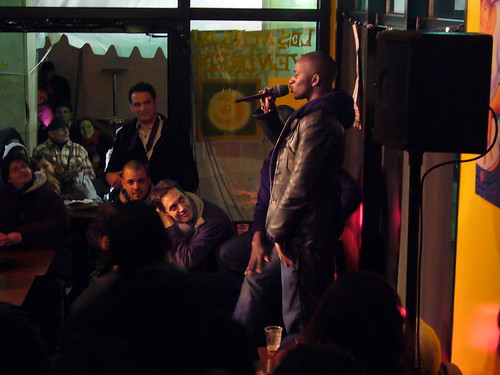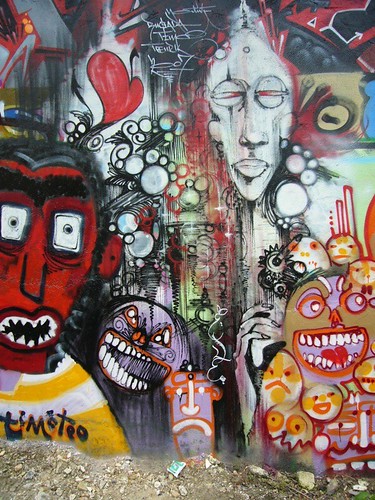20/05/10
What is it that I’m studying “the making of…”?
For a long time, the preliminary title of my research project was communities in the making… I was thinking of Britain and France as the two communities that were in a constant state of creation and recreation. Then I realised how flawed this title was. First of all, many misunderstood what I meant by “community”, thinking that I had such an old-fashioned perspective on society as consisting of different (“ethnic” or whatever) “communities” that were reproducing themselves. (Perhaps I lost a PhD scholarship that way). Second, I finally realised that it wasn’t strange that people misunderstood, as “community” is the very word particularly favoured in multicultural thinking of ethnic minorities. The word then seemed to be useless for my usage in general, and particularly useless, as I wanted to employ it on the situation in France. There, the word seemed most commonly used in relation to communautarisme; the community-making of religious or “ethnic” minorities which threatens the societal cohesion of society as a whole. “Society” seemed thus a better choice.
But what is “society”?
14/05/10
Home Migration and the City: New Narratives, New Methodologies – here I come!
03/05/10
Qualitative and quantitative ways of seeing (social) integration
Suddenly, at least to me, the ESF, European Science Foundation, pops up everywhere with interesting conferences and seminars. I’ve already applied for Home, Migration and the City: New Narratives, New Methodologies, a combination of themes which matches perfectly with my research. Now, I aim for an extremely interesting seminar in Paris, which appears equally made for my research perspective, but at the same time is very challenging. The perfect match is that they want to look at two differing approaches to incorporation of immigrants in Europe (one focused on social/cultural integration the other on (anti-)discrimination measures), a comparison which is very similar to my aim of comparing the two different philosophies of social integration in (“multicultural”) Britain and (republican) France. The challenge is that their research is quantitative! Quantitative methods in the Social Sciences: Immigration and Population dynamics: Measuring Integration and Discrimination. Do they want my qualitative approach? I doubt it, but I’m going to try anyway. Besides, the precision they demand from the use of concepts is a very gratifying challenge:
15/04/10
What can people learn from your research?
Yesterday, I had to answer the question: “What can people learn from your research?” Eh… Learn from what I do? So this job isn’t just a way of keeping another overqualified person out of unemployment statistics? Well, joke aside, …but I have to admit that such an upfront and naïve question up here in our ivory tower-existence made me realise that I think far too little about the very simple fact that people might learn something from what I do. Even if I often think that much in this world is outside of my jurisdiction and beyond repair, I hope I haven’t totally given up on the idea that what I do might be useful, - also above the personal pleasure of it and the societal benefit of not spending my days doing something that is harming the environment more. From now on, I’ll have in the back of my mind; what can the reader learn from what I write… or perhaps less didactic and patronising; which experiences do I want to convey? What do I want the reader to experience and retain from my text? Something like that…
And what did I answer to the question yesterday? First, I though eh… something about social classification blah blah…? That they are different in different societies…? That social cohesion and nationalism is different in different societies…? No, these things people say all the time. What I really want try to convey is perhaps the greatest thing about the Parisian slam poetry: How little it takes to create an inclusive environment where even a newbie like me can feel at home, and where one get to know others and get to express oneself. Can I write a manual to an open, cosmopolitan democracy in practice!?
25/03/10
10 days intervals for a peaceful but alert diary-keeper’s mind

Ethnographic documentation? Art? Anyway: It’s spring! Let not the expulsions blossom - Resist!
When I started blogging again, I gave myself a 10-days interval between blog posts. The interval should be long enough to be realistic and feel comfortable, but not so long that I lose sight of the trains of thought I keep on track here. To blog regularly, sharpens the attention (as I said a long time ago here) to the little tidbits that pop up in the mind which somehow connect to the research process, without being speaking directly to what I’m working on.
There are a couple of blog posts at various stages along the production line, but as I discovered today that I’m three days late for my self-imposed 10 days deadline, I’ll skip the mindfulness and instead just quickly sum up one thing I’ve been working on lately.
At the same time as I read Knausgård and pondered upon anthropological elements in novels, Aleksandra Bartoszko interviewed me (in Norwegian) about some photos I’d taken during my fieldwork in Paris. Inspired by an art exhibition (see the interviews with the artists Lange and Heier), she made a series of interviews on ethnography and art and asked me about how I saw the differences between the two. I’d never thought of my photos neither as ethnography nor as art, and she made me think about the criteria I – until then, unconsciously – confer on the one and the other. The co-occurrence of the interview and my plunge into fiction inspired me to initiate a workshop on Representations of social life (Norw.) at the Norwegian Anthropological Association’s annual meeting, which Aleksandra and I will co-chair.
12/03/10
Writing and performance

It was hard picking a photo for this post. So many of my photos evoke memories from my many slam nights in Paris, but how to find a photo that can convey some of theses feelings to the readers of this blog… With this one, I hope to put across the mundaneness of French slam (the greengrocer’s Sharazade in the background), as well as some of it’s diversity of participants.
My thesis takes shape from the margins, and slowly, slowly am I circling in the core chapters. I don’t think this is a particularly good way of composing the general argument of the work, but I have a fairly good idea of why the core content just keep slipping away from me. The final part of this core, the chapter where I give an in depth analysis of the slam sessions, is finally now on its way. Thus on a deeper level, it feels like I’ve always had an idea of what goes on. But to actually describe what happens, is far harder. The first part of what I call the core, is thus just very hard to get a grip on.
02/03/10
Anthropologists and novelists, part two
Anthropology is just one way among many fields that try to make sense of and represent social life. A post ago I stated that it probably isn’t even the most superior at it. Funnily, in the days after I wrote that post, I read in the papers several similar comments made by other social scientists.
“The best novelists and playwrights are – almost by definition – those who understand human nature better than others” (the social and political theorist Jon Elster quoted by the ditto theorist Rune Slagstad in Morgenbladet 19-25, 2010. Jon Elster is interested in the role emotions play in relations to knowledge and behaviour. And no social scientist gets as deep into these intricacies as authors.
The gender researcher and novelist Wencke Müleisen has provided some fine social science inspired analyses of Knausgård’s writing earlier, and some days ago in a feminist column in Klassekampen she, too, ended her comment by singing the praise of novels:
A friend told me that while reading volume three [about childhood], she realised for the first time that her mother had behaved similarly [passive] in relation to her father’s aggressive behaviour. … It is hard to understand how this passive feminine violence seeps so invisibly into a kind of cultural gender pattern that one simply just doesn’t see it. In that respect, it is telling that in Knaugsård’s novel, [the mother’s deceit] is staged [“iscenesatt”] as absence and silence. Much seem to indicate that more readers get activated unpleasant memories of fathers’ aggression and mothers’ betrayals. The visibility of masculine violence makes us blind of the feminine passive acceptance. Language at work [“språkarbeid”] is needed. Novels can do that. (KK 22.02.2010, my translation)
Why is that? How do novelists do that? Does it have anything to say that the versimilitude (truthlikeness) of their depiction of the world within and around us resonate with the reader’s experience, rather than hinge on the logics of scientific methodology? Or is it a function of the literary language compared to concise concepts?
23/02/10
An Ariadne’s thread?

Souleymane Diamanka at Café Culturel in Saint Denis in the suburbs outside Paris
Haven’t I claim that French slam poetry can be seen as a commentary on and/or a representation of French society? Yes, certainly I have. From my very first slam session, I’ve felt that there was a strong connection between scene and society. And then, when I was exploring further the relations between anthropology and literature I wrote about in the previous post (and which I’ll come back to soon), I made a giant step forward in getting to grips with the relationship. Suddenly, I saw a clear connection between the slam scene in the years 2006-2007 and the riots in the autumn 2005 and the deepest oppositions in French society. All thanks to the ritual and performance theorist who for a long time has been looming in the background, or rather in the middle of the heaps of books I’m building my project upon. This is not to reduce the artistic element of the slam phenomenon. On the contrary, good ol’ Victor Turner conjoins the two – theatre and social drama – on a deeper level and shows how the two actually feed off each other.


